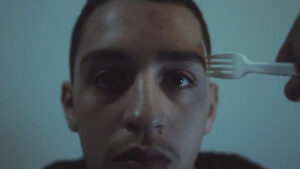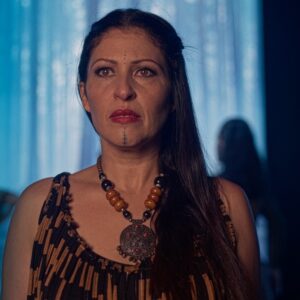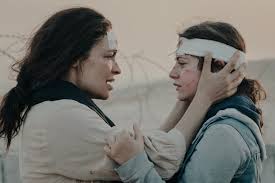A return to non-traditional documentary forms was an excellent move for Kaouther Ben Hania, whose Four Daughters, billed as a “a fictional documentary,” brings the Tunisian director back to her strengths at finding creative ways to explore difficult topics.
In this instance, it’s the story of Olfa Hamrouni, a strong-minded working-class woman with four daughters, two of whom joined Islamic State in Libya following a wild teenage stage. Olfa is such a trickily charismatic figure, and her two younger daughters so disarmingly articulate, that Ben Hania needed a way to get them to open up without allowing them – Olfa in particular – to hide behind well-practiced responses. To that end, she brought in two actresses to play the missing daughters and star Hend Sabri to impersonate Olfa, leading both sides to interrogate the recreations and prevent standardized reactions to difficult junctions in their lives. The resulting film is an enthralling hybrid that explores matriarchy, rebellion, and extremist religion’s poisonous misogyny; while the Cannes competition slot is a peculiar fit, it will likely help Four Daughters reach the wider audience it deserves.
By the time Ben Hania began shooting, Olfa had been interviewed multiple times by Tunisian media, making it all but impossible to get this deeply self-protective woman to drop the multiple filters that had become second nature to her. In addition, the director didn’t want to focus on the radicalization of her eldest daughters but rather their lives before, encompassing Olfa’s difficult childhood, disastrous relations with men, and deeply problematic censuring of her daughters’ sexuality. The solution was to shoot in a single location, with Sabri and Olfa not just alternating in some of the recreations but discussing together the mother’s motivations, while the two younger daughters Eya and Tayssir provide commentary and play themselves. The approach is honest and beguiling, allowing for deeper, more honest probing than would have been possible in a traditional documentary.
The pitfalls of what could have been are addressed early on, when Sabri explains that actors are trained to protect themselves from becoming emotionally overwhelmed by a role, leading Olfa to ask, “what if you can’t?” This interplay between the two – Sabri is a canny performer who knows how to get Olfa to reveal herself – on top of direct questions from Ben Hania as well as challenges from Eya and Tayssir uncover a complex and contradictory woman whose fascination goes far beyond her public persona as a mother grieving for two Islamic State brides. Patterns of toxic behavior passed from generation to generation go back a long way even before Olfa’s abusive husband tried to rape her on their wedding night, and Olfa’s sister urged her to stop resisting and take it. In the end it was the husband who got beaten up, and the blood on the sheets was his, but notwithstanding her ability to stand up for herself, Olfa couldn’t disassociate from the twisted expectations of how daughters are meant to behave in religiously conservative homes.
The role model the girls grew up with was a mother who could rule the roost but also allowed herself to be mistreated by men (all impersonated by actor Majd Mastoura). Though physically abused herself as a child, Olfa passed on that abuse to her daughters, terrified their burgeoning sexuality was inherently sinful yet turning a blind eye to what her boyfriend was doing them when she wasn’t around. At one point a recreation becomes so disturbing that Mastoura, concerned for the mental health of Eya and Tayssir, asks Ben Hania to cut the scene, but it’s Eya who insists they continue, explaining that she’s already played it out over and over with psychologists. It needs to be said here that Eya and Tayssir are extraordinarily photogenic young women who take to the camera like pros, but they have an ingenuous quality that makes their ebullient resilience feel honest and unforced.
Actresses Nour Karoui and Ichraq Matar are brought in to play older daughters Rahma and Ghofrane in their adolescent/early teen years, when the two girls began acting out – there’s a revealing moment when Eya, Tayssir and the two actresses playfully talk about their bodies, the lines between fiction and non-fiction thoroughly blurred, and the black clad, hijab-wearing Olfa mutters, “what a bunch of whores.” Even after everything that’s happened to her family, she’s still unable to excise this obsession with religiously-imposed modesty, and it’s the stubborn resistance of this cancerous belief that becomes the film’s most disturbing element.
Olfa beat her daughter senseless for dying her hair and waxing her legs, so much so that the trauma made Ghofrane turn in the opposite direction, suddenly wearing not only a hijab but the face-covering niqab as well. It acted like an infection within the close-knit family, where soon they were all cloaked and drawn into an extreme form of Islam until the day when Ghofrane and Rahma crossed into Libya and joined up with Daesh.
Ben Hania is on much firmer ground than she was in the painful misfire The Man Who Sold His Skin, back to imaginatively exploring subjects she knows something about, as with her excellent early mockumentary The Challat of Tunis. With Four Daughters she’s taken one extraordinary family and given them the scope to tell their story while allowing them to see it from another perspective, with the collateral hope that in so doing the cycle of intergenerational dysfunction can be severed. Whether Olfa herself can see the extent of her damage is unclear, but the truth is it’s not only actors who need to protect themselves.
Director, screenplay: Kaouther Ben Hania
With: Hend Sabri, Olfa Hamrouni, Eya Chikhaoui, Tayssir Chikhaoui, Nour Karoui, Ichraq Matar, Majd Mastoura
Producers: Nadim Cheikhrouha, Habib Attia, Thanassis Karathanos, Martin Hampel
Cinematography: Farouk Laaridh
Production designer: Bessem Marzouk
Costume designer: Anissa Ghelala
Editing: Jean-Christophe Hym, Qutaiba Barhamji, Kaouther Ben Hania
Music: Amine Bouhafa
Sound: Amal Attia, Manuel Laval, Henry Uhl, Maxim Romasevich
Production companies: Tanit Films (Tunisia) in collaboration with Cinétéléfilms (Tunisia) and Twenty Twenty Vision (Germany), Red Sea Film Festival Foundation (Saudi Arabia), Zdf/Arte (Germany), Jour2Fête (France)
World sales: The Party Film Sales
Venue: Cannes (Competition)
In Arabic, French
107 minutes

.png)






I like this weblog it’s a master piece! Glad I observed this ohttps://69v.topn google.Raise your business